
Authentic Polynesian Dance Shows Teeming
with Energy
The hula girls here take the stage only after completing intensive dance training at Joban Music and Dance Institute. The authentic Polynesian shows unveiled on the expansive Beach Theater are packed with pulsating power and primal thrills and are the single greatest draw of Spa Resort Hawaiians. The lineup includes lovely and elegant hula dances, the passionate and fierce hip gyrations of Tahitian dance routines, and Samoan style dancing that features the breathtaking energy of the “fire knife dance,” which is presented by dynamic male performers. Other show highlights include the light and nimble rhythm of Maori dancing from New Zealand and other examples of the richly diversified dancing styles indigenous to tropical island realms.

Grand Polynesian Show
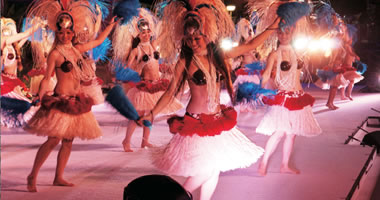
Powerful, driving routines in the midst of colorful lighting and dynamic sound raise the voltage of Spa Resort Hawaiians to peak heights after dark.
Hula Girls Polynesian Review
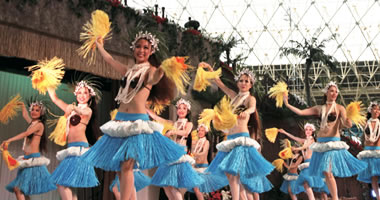
You can enjoy a rousing collection of Polynesian ethnic dances, which perfect the tropical mood as they are performed in the liberated atmosphere of a large domed stage surrounded by lush greenery from tropical lands.
Paradise Cove
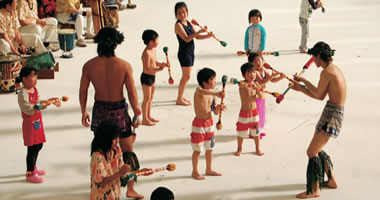
Hula girls and fire knife dancers provide mini dance lessons and instructions on how to use the musical instruments and tools used in the shows.
Fire Knife Dance
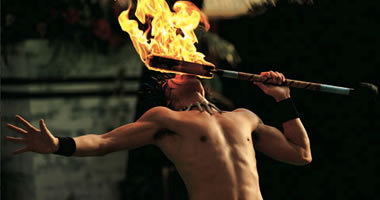
Don’t miss the fire knife dancers performing this wild and energypacked Samoan tradition—another centerpiece of the Polynesian Show.
Joban Music and Dance InsFtute

Joban Music and Dance Institute is a school created to train women aspiring to become the “hula girl” dance stars in the Polynesian Show. The institute was established the year before the Joban Hawaiian Center opened to the public and has produced a steady stream of hula girls ever since. The instruction here is thorough. It begins with the basics of folk dancing, and it is rooted in classical ballet. The strengths of individual students are maximized in the quest to transform them into full-fledged professional entertainers. To produce dancers with balanced backgrounds, the curriculum expands beyond dance lessons to encompass voice training, tea ceremony, Japanese flower arrangement, ukulele playing, magic, Polynesian culture, and other subjects. Students enroll in April, and following around three months of intensive training, debut at the Beach Theater. The program continues for two years in all, with graduates certified as professional dancers capable of launching full-fledged caree s.-wide panorama stage with tropical trees in the background, used for the daily Polynesian shows starring hula girls. The stadium-style venue includes admission-fee seating with a complimentary drink included, while guests opting for the special SS seats can pose for souvenir photos with the hula girls.
Hula Girls (the Movie)
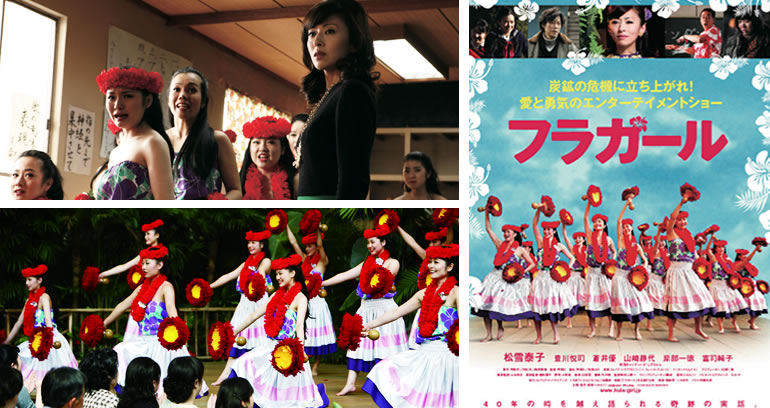
This is a feature-length film based on the true story of the events leading up to the opening of Joban Hawaiian Center, the predecessor of today’s Spa Resort Hawaiians. The film depicts the friendship fostered between a dance instructor and local women who devote themselves to mastering Hawaiian dancing—which they had never laid eyes on before—and carry the project to success. The film is an inspiring saga of the human spirit viewed through efforts to revitalize a region in serious decline. Hula Girls was chosen as Japan’s entry for the Best Foreign Language Film at the 79th Academy Awards in the United States. In Japan, it was honored with five awards (including Best Film) at the 30th Japan Academy Awards, and it also won a huge number of other prizes in the cinema field that year.
The Story
The setting is the coalmining town of Iwaki City, Fukushima Prefecture, in 1965. Japan is shifting away from coal to oil as its mainstay energy source, prompting the steady closure of traditional mines. To save Iwaki from this crisis, locals mobilize to build a “perennial summer paradise” theme park. Joban Hawaiian Center Director Yoshimoto (played by actor Ittoku Kishibe) lures dance instructor Madoka Hirayama (Yasuko Matsuyuki) from Tokyo to teach hula dancing to local girls in the community. Formerly a prominent dancer, at first Madoka looks down on the country town and detests her job of teaching total amateurs (who have never even seen the hula performed). In time, however, she is won over by the sheer zeal of Kimiko (Yu Aoi) and other local ladies (Shizuyo Yamazaki, Shoko Ikezu, Eri Tokunaga, etc.) and rekindles her own past passion for dance. Though they are faced with the dire realities of a dying town, the local women, buoyed by their mutual friendship, devote major time and energy to mastering the beauty and essence of hula dancing. The film retells the true story of the local people behind the launch of the Joban Hawaiian Center (the current Spa Resort Hawaiians), against the backdrop of superb Hawaiian music and dance truly worthy of the Hawaiian homeland.
- Director: Lee Sang-il (other films include 69, Villain, Yurusarezaru mono)
- Music: Jake Shimabukuro
- Acting/Choreography: Kaleinani Hayakawa (Senior Advisor, Joban Music and Dance Institute)
- Sponsors: Cinequanon, Happinet Pictures, S-D-P.
- Planning, production and distribution: Cinequanon
Hula Museum
The world’s only museum devoted to hula dancing, stocked with rare displays and information available only at Spa Resort Hawaiians. Exhibits document the history and culture of the Hawaiian Islands and the history of the resort and present precious artifacts and materials from the 2006 film Hula Girls along with other attractions.
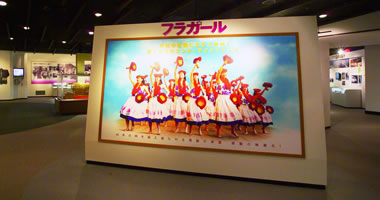
Welcome SecFon
A jumbo-sized panel from the movie Hula Girls greets visitors at the entrance. Also displayed are important letters from key figures in the State of Hawaii, with which the resort carries on close relations.
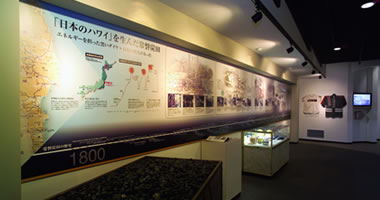
Joban Coalfield History SecFon
Detailed explanations of the Joban coalfield, which helped fuel Japan’s postwar modernization and high economic growth. The section examines the struggle to develop the hot spring, the rise and fall of the coal industry, and other aspects of the quest to sustain the local community and businesses.
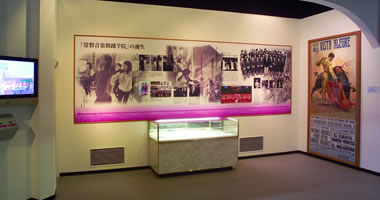
Joban Hawaiian Center
& Spa Resort Hawaiians SecFon
Historical review of the birth of Joban Music and Dance Institute, the drive to establish Joban Hawaiian Center, and what happened after the community transitioned from coalmining to a tourist-based community.
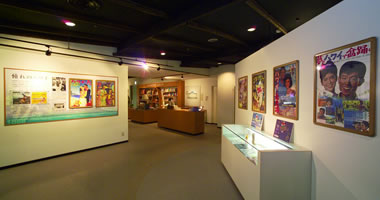
Dreamy Hawaii SecFon
An introduction to Hawaii, the island paradise that Spa Resort Hawaiians is modeled on, using scenes from movies inspired by the “Hawaii boom” of Japan’s postwar era, celebrities visiting the islands, and other images.

Hula Girls (the Movie) SecFon
Exclusive exhibits of precious artifacts from the awardwinning movie Hula Girls, including costumes and props actually used in the filming and the autographs of the actors.

Hula and Hawaiian Culture SecFon
A detailed look into hula, a distinctive aspect of Hawaiian culture, through its history, costumes, and musical instruments, as well as literature and other information showcasing the traditional dance and the islands themselves.



